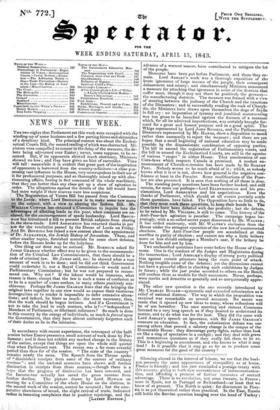NEWS OF THE WEEK.
THE two nights that Parliament sat this week were occupied with the winding-up of some business and a few parting blows and skirmishes of a desultory kind. The principal contest was about the Ecclesi- astical Courts Bill, the second reading of which was obstructed. Mi- nisters were compelled to concur in the delay of the measure, the de- bate being adjourned over Enter; never, some suppose, to be re- sumed. But, if its opponents showed Much obstinacy, Ministers showed no less ; and they have given no hint of surrender. Time ,will tell : meanwhile it is evident that great part of the inspiration -of opponents is borrowed from the country-solicitors—a class pos- sessing vast influence in the House, very unscrupulous in their use of it for professional purposes, and so thoroughly mixed up with elec- tioneering affairs, having in fact command of the whole machinery, that they can better than any class get up a show of agitation to order. The allegations against the details of the bill would have had more weight if their sources were less suspicious. The Registration of Voters Bill has passed from the Commons to the Lords ; where Lord BROUGHAM is to make some new move on the subject, with a view to altering the Reform Bill. Mr. WILLIAM COWPER has obtained a Committee to inquire into the advantages of allotting lands to the poor, when commons are en- closed, for the encouragement of spade husbandry. Lord Baocci- HAM has introduced a bill to prevent British subjects from sharing in the slave-trade. Lord Assn:mayor/ has returned thanks in per son for the resolution passed by the House of Lords on Friday. And Dr. BOWRING has raised a new contest about the appointment
s. -
of Dr. ALEXANDER, the Jewish Bishop of Jerusalem. These, and
other smaller topics, furnished materials for some short debates, before the Houses broke up for the holydays.
One thing not done may be noticed. Mr. ROEBUCK asked Sir JAMES GRAHAM whether effect was to be given to the recommenda- tion of the Criminal Law Commissioners, that there should be a code of criminal law. Sir JAMES said, no: he showed what a vast amount of work is to be done ; said he did not think Government could undertake it, nor a Royal Commission—it would need a Parliamentary Commission; but he was not prepared to recom- mend one. Why not ? If the labour would be immense, what reason is there, except that the law is such a mass of confusion as to be in a number of cases useless, in many others positively mis- chievous. Perhaps Sir JAMES GRAHAM fears that the bringing the original laws together in one view would so expose their enormous incongruities as to render it impossible to defer extensive altera- tions; and indeed, he hints as much : the more necessary, then, that the work should be begun betimes. And if a Government is not to take the lead in such matters, who is ?—" independent" Members of Parliament, or dilettanti reformers? So much is done in this country by the energy of individuals, so much is forced upon the Governments' that they have almost uniformly forgotten such of their duties as lie in the initiative.


















































